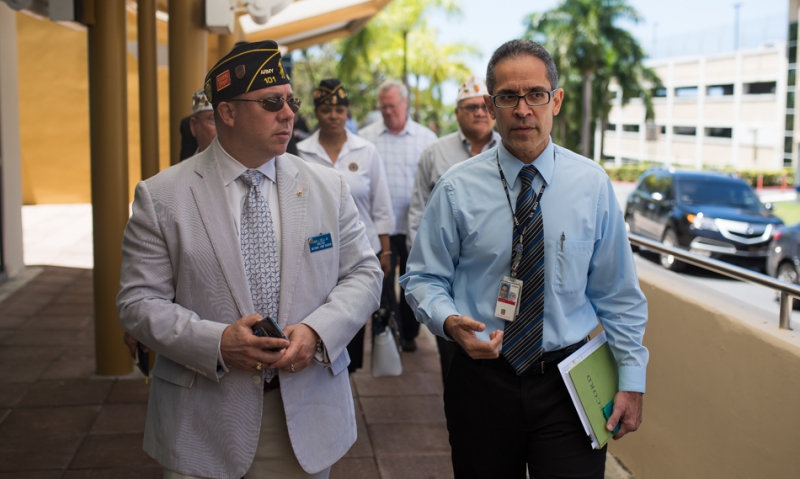
With electricity costs three times greater than in the United States, the San Juan hospital often has budget overruns.
The Department of Veterans Affairs medical center in San Juan, Puerto Rico, faces the annual challenge of paying for its utilities, since costs are much higher on the island than stateside.
The hospital’s director, Duane Hamlin, said he automatically takes about $10 million off the top of his fiscal year budget to make sure the lights stay on at the hospital; this often means shortfalls in other areas. “The good news is, the services we provide are based on the care needs of our veterans - we’ll figure out the dollars.”
Hamlin spoke about the hospital’s financial challenges at an April 7 meeting with Louis Celli, director of The American Legion’s Veterans Affairs & Rehabilitation Division. Celli asked whether energy costs could be reduced by further development of solar power. Hamlin said the hospital has received funding to do just that - wind turbines are also being used. “But we can’t run everything on solar power,” Hamlin said.
According to Antonio Sanchez, the hospital’s chief of staff, the San Juan VA Medical Center is consistently underfunded. But each year, the facility gets financial bailouts from its Veterans Integrated Service Network (VISN).
“The VISN bailouts are necessary but not a long-term solution,” Celli said. “The American Legion would like to see Congress and VA work together to increase San Juan’s budget so that VISN funding can be used for other needs.”
Addressing the issue of Puerto Rico’s homeless veteran population, Hamlin said, “It is difficult to get a handle on that, but we do have an outreach program here and in the Virgin Islands.” He said the VAMC has a homeless veterans outreach coordinator and collaborates with Veterans Centers and other agencies on the island to assist those homeless who have served in the military.
Yet, according to hospital staff, the medical center has assisted only 1,000 homeless veterans since 2006. “San Juan has a good program in place and they have a collaborative network in place," Celli said. "The American Legion’s national staff will work closely with local Legionnaires to provide assistance to the island’s homeless veterans.”
Sanchez said the hospital has a program that provides job training for homeless veterans and places them into the private sector; 35 individuals graduated from that program last year.
Another issue raised at the meeting by Celli was the San Juan facility’s effectiveness in getting the word out on VA’s program to protect whistleblowers. “I saw a whole stack of posters on someone’s desk that explain to VA workers how they will be protected from retaliation if they report violations. But I didn’t see many of them actually posted around the hospital. Your workers need to know they are protected if they decide to blow the whistle on people abusing the system or not doing their jobs.”
On April 13, the House Committee on Veterans' Affairs will hold a hearing to examine allegations that VA continues to retaliate against whistleblowers. According to the committee’s press release, the Office of Special Counsel has received “a record number of VA whistleblower retaliation claims this year.”
- Veterans Healthcare

